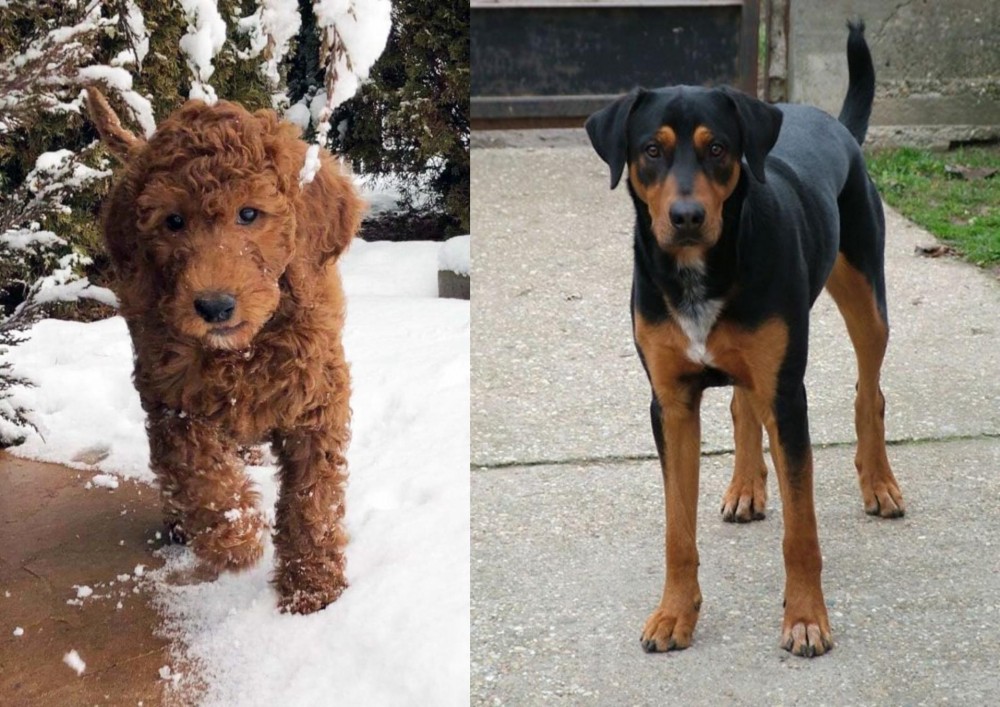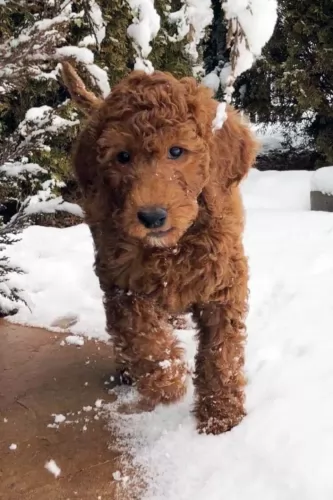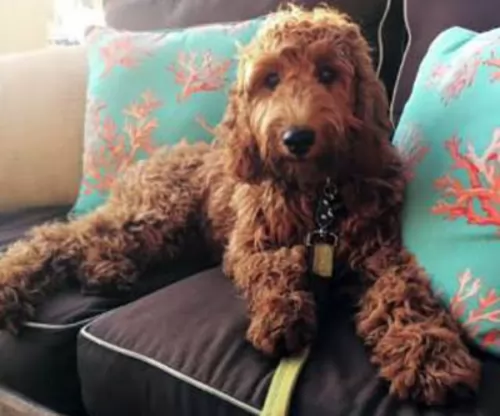 Petzlover
Petzlover Irish Doodles is originated from United States but Hungarian Hound is originated from Hungary. Irish Doodles may grow 27 cm / 10 inches shorter than Hungarian Hound. Both Irish Doodles and Hungarian Hound are having almost same weight. Both Irish Doodles and Hungarian Hound has almost same life span. Irish Doodles may have more litter size than Hungarian Hound. Both Irish Doodles and Hungarian Hound requires Low Maintenance.
Irish Doodles is originated from United States but Hungarian Hound is originated from Hungary. Irish Doodles may grow 27 cm / 10 inches shorter than Hungarian Hound. Both Irish Doodles and Hungarian Hound are having almost same weight. Both Irish Doodles and Hungarian Hound has almost same life span. Irish Doodles may have more litter size than Hungarian Hound. Both Irish Doodles and Hungarian Hound requires Low Maintenance.
 Known also as the Irish Doodle Setter or the Irish Setterdoodle, the Irish Doodle is a crossbreed – a mix of Irish Setter and Poodle.
Known also as the Irish Doodle Setter or the Irish Setterdoodle, the Irish Doodle is a crossbreed – a mix of Irish Setter and Poodle.
This designer crossbreed comes from the United States. There isn't much of a history with the Irish Doodle, though both breeds used to create this dog breed have their own long histories.
Because the Irish Doodle is a hybrid breed, it isn’t recognized by the American Kennel Club. It is however recognized by the American Canine Hybrid Club.
 The Hungarian Hound, also known as the Transylvanian Hound, originated in ancient Hungary as a hunting dog. At the time there were Asian Hounds that traveled with Hungarian Magyar tribes into Transylvania. As early as the 9th century it is believed that these Hungarian dogs were crossed with Celtic Hounds and local dogs. The result is the Hungarian Hound. These dogs were incredibly popular throughout Transylvania.
The Hungarian Hound, also known as the Transylvanian Hound, originated in ancient Hungary as a hunting dog. At the time there were Asian Hounds that traveled with Hungarian Magyar tribes into Transylvania. As early as the 9th century it is believed that these Hungarian dogs were crossed with Celtic Hounds and local dogs. The result is the Hungarian Hound. These dogs were incredibly popular throughout Transylvania.
This scent hound almost became extinct but was saved by intense breeding during the latter part of the 21st century. They developed two kinds, short and tall, for different types of hunting. The tall dogs hunted boar, bison, lynx and bear. The short dogs hunted hare, fox and chamois.
Only the tall dogs exist today. Some Hungarians raided parts of Europe and took the dogs with them. There was then a crossing breeding with Polish dogs. The tall dogs exist today in Hungary and Romania. The Hungarian Kennel Club recognized the breed and the United Kennel Club (UKC) from the United States recognizes them. No major clubs such as the AKC (American Kennel Club) or the British Clubs. The breed was accepted into the AKC Foundation Stock Service Program
 The Irish Doodle is a medium sized dog, standing at roughly 33cm to 38cm and weighing roughly 18kg to 31kg.
The Irish Doodle is a medium sized dog, standing at roughly 33cm to 38cm and weighing roughly 18kg to 31kg.
Pet owners appreciate that a dog like this is considered to be hypoallergenic and this attractive aspect of this dog comes from the Poodle side. The Irish Doodle's coat is long, soft and fairly wavy with apricot being the most common coat color but other colors include white, cream, brown and black. The head and muzzle is longish, the eyes brown, the ears floppy and the tail long.
The Poodle and the Irish Setter combine to ensure that the Irish Doodle is an intelligent dog and that he has an amicable disposition so that he is good with kids and pets in the home.
He has a host of excellent characteristics that make him a superb family pet and these are friendliness, intelligence, devotion and loyalty. He is easy to train and training and socialization will make him obedient so that he responds well to simple instructions such as come, stay, lie down, sit etc.
 The Hungarian Hound is a medium sized dog, a scent hound with the same characteristics of the type of hunting hounds found in Mid-Europe. The breed is a hardy one with a long head slightly domed skull. The muzzle is short, and the jaws are strong. The lips are black, and the ears are round and hang. Their eyes are shaped like almonds and dark brown. The breed has large paws with cushioned pads and strong toes.
The Hungarian Hound is a medium sized dog, a scent hound with the same characteristics of the type of hunting hounds found in Mid-Europe. The breed is a hardy one with a long head slightly domed skull. The muzzle is short, and the jaws are strong. The lips are black, and the ears are round and hang. Their eyes are shaped like almonds and dark brown. The breed has large paws with cushioned pads and strong toes.
 The Irish Doodle is guaranteed to make you a great pet. Every dog becomes better when they have been trained and socialized as they require having interactions with other dogs and people to know how to behave around them later on.
The Irish Doodle is guaranteed to make you a great pet. Every dog becomes better when they have been trained and socialized as they require having interactions with other dogs and people to know how to behave around them later on.
The Irish Doodle is a playful, active, attractive, loyal, fun loving pet who will learn easily.
The most important thing to remember with your Irish Doodle is to get involved in his life. He didn’t ask to come to you, but if you do your part and treat him like a much loved family member, you’ll soon see that your life isn’t complete without a wonderful 4-legged friend like the Irish Doodle.
 Children friendliness – This breed is very friendly with children.
Children friendliness – This breed is very friendly with children.
Special talents - Hunting independently and at a distance from the hunter.
Adaptability – Not an apartment dog. They need space and land.
Learning ability – They are very independent and intelligent.
 Irish Doodles are a robust, resilient breed, and with good care they can live to be 11, 12, 13 or 14 years. Nonetheless you need to know about the more common dog illnesses that any dog can develop.
Irish Doodles are a robust, resilient breed, and with good care they can live to be 11, 12, 13 or 14 years. Nonetheless you need to know about the more common dog illnesses that any dog can develop.
These are hip dysplasia, eye problems, ear infections, bloat and Von Willebrand's Disease.You can improve your dog’s health by making sure he gets the very best food there is to eat, a warm, dry place to sleep and that he is treated with lots of love and care.
Von Willebrand's disease is an inherited bleeding disorder. The disorder comes about because of a deficiency of von Willebrand Factor. This is an adhesive glyco-protein in the blood which is necessary for platelet binding or clotting. The condition can lead to excessive bleeding after an injury because the blood can’t clot.
 Even though this is an ancient breed they do face certain medical issues such as:
Even though this is an ancient breed they do face certain medical issues such as:
 Even though the Irish Doodle's coat is long, this is a dog with just about no shedding, so a brush once a week will ensure his coat stays in tip-top condition. Some Irish Doodle owners like to take their pet to have the coat professionally trimmed.
Even though the Irish Doodle's coat is long, this is a dog with just about no shedding, so a brush once a week will ensure his coat stays in tip-top condition. Some Irish Doodle owners like to take their pet to have the coat professionally trimmed.
The Irish Doodle isn’t one of these dogs where you need to ensure a good dose of exercise every day. He doesn’t particularly need a lot of exercise, so include him in your daily walks and give him a ball game now and then to keep him happy and fit.
As a medium sized dog, your Irish Doodle will require a high quality diet that will ensure he is getting all the right minerals and vitamins he needs for his activities.
If you choose one of the wet or dry commercially manufactured foods, make sure it is one of the best quality ones free from fillers, colorants and preservatives. It is to your pet’s benefit to add in some homemade food to his kibble such as cooked chicken, brown rice, pasta and vegetables.
Raw meat is expensive, but if you can, give him some raw meat occasionally too as this promotes bright eyes, a wet nose and a healthy skin and fur.
Fresh, cool water must be provided every day non-stop.
 Feeding the puppy – 1-3 cups of high quality food served in 3-5 meals per day.
Feeding the puppy – 1-3 cups of high quality food served in 3-5 meals per day.
Feeding the adult – 3-5 cups of high quality food served in 2-3 meals a day.
Points for Good Health – generally healthy
Games and Exercises – The Hungarian Hound is a hunting dog and therefore accustomed to and bred for a high level of exercise. Their instinct for hunting is really strong so make sure you do not let them off leash outside of a contained area. They excel at tracking, field trials, lure chasing, and fly ball.